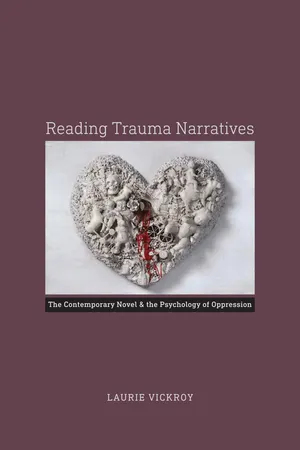
Reading Trauma Narratives
The Contemporary Novel and the Psychology of Oppression
- 216 pages
- English
- ePUB (mobile friendly)
- Available on iOS & Android
About this book
As part of the contemporary reassessment of trauma that goes beyond Freudian psychoanalysis, Laurie Vickroy theorizes trauma in the context of psychological, literary, and cultural criticism. Focusing on novels by Margaret Atwood, William Faulkner, Toni Morrison, Jeanette Winterson, and Chuck Palahniuk, she shows how these writers try to enlarge our understanding of the relationship between individual traumas and the social forces of injustice, oppression, and objectification. Further, she argues, their work provides striking examples of how the devastating effects of trauma—whether sexual, socioeconomic, or racial—on individual personality can be depicted in narrative.
Vickroy offers a unique blend of interpretive frameworks. She draws on theories of trauma and narrative to analyze the ways in which her selected texts engage readers both cognitively and ethically—immersing them in, and yet providing perspective on, the flawed thinking and behavior of the traumatized and revealing how the psychology of fear can be a driving force for individuals as well as for society. Through this engagement, these writers enable readers to understand their own roles in systems of power and how they internalize the ideologies of those systems.
Frequently asked questions
- Essential is ideal for learners and professionals who enjoy exploring a wide range of subjects. Access the Essential Library with 800,000+ trusted titles and best-sellers across business, personal growth, and the humanities. Includes unlimited reading time and Standard Read Aloud voice.
- Complete: Perfect for advanced learners and researchers needing full, unrestricted access. Unlock 1.4M+ books across hundreds of subjects, including academic and specialized titles. The Complete Plan also includes advanced features like Premium Read Aloud and Research Assistant.
Please note we cannot support devices running on iOS 13 and Android 7 or earlier. Learn more about using the app.
Information
Table of contents
- Cover Page
- Title Page
- Copyright
- Dedication
- Contents
- Preface
- Introduction: Ways of Reading Trauma in Literary Narratives
- One: Re-creating the Split Self in Margaret Atwood’s The Blind Assassin and Alias Grace
- Two: Fear and Commodification in the Shaping of America in Toni Morrison’s Paradise and A Mercy
- Three: Obsessions and Possessions in William Faulkner’s Absalom, Absalom!
- Four: The Traumas of Love and Death in Jeanette Winterson’s Written on the Body
- Five: Trauma, Gender, and Commodification in Chuck Palahniuk’s Fight Club and Invisible Monsters
- Conclusion: Trauma as a Critical Juncture of Society, Culture, and Human Psychology
- Notes
- Bibliography
- Index